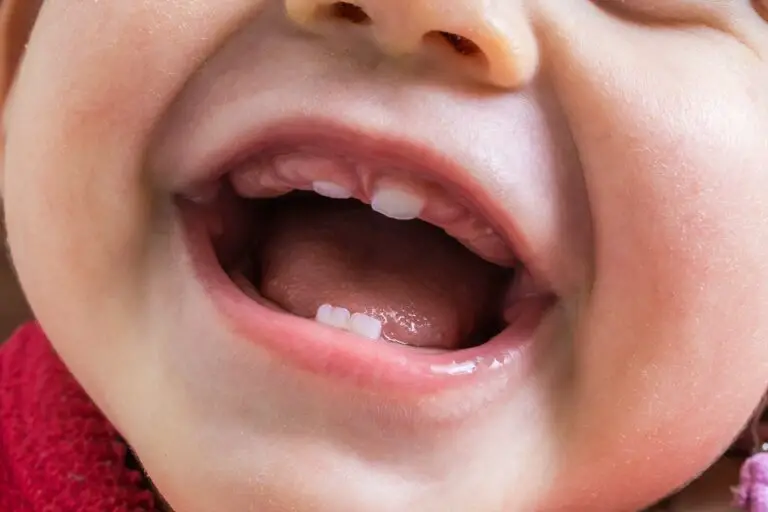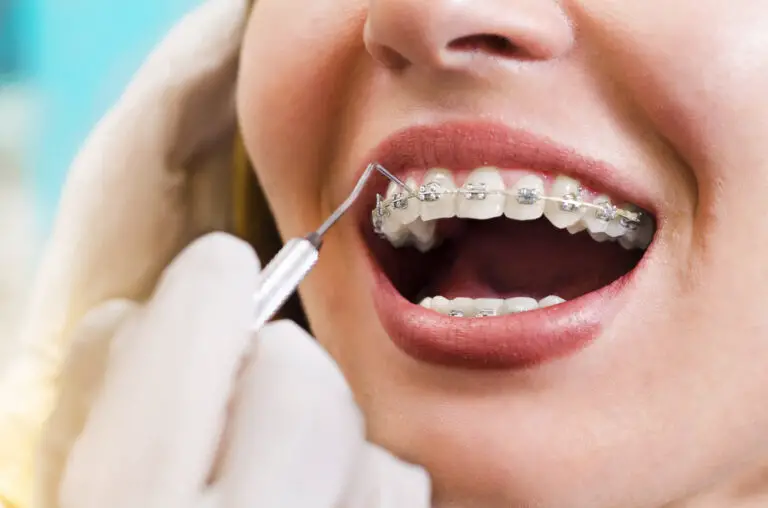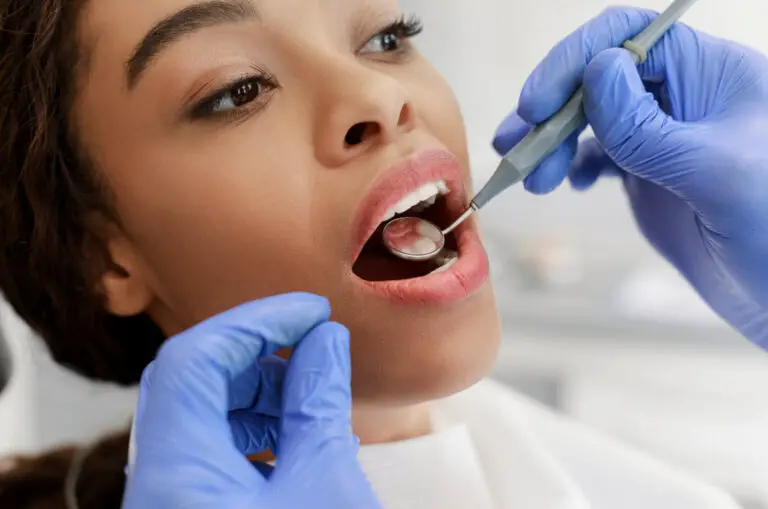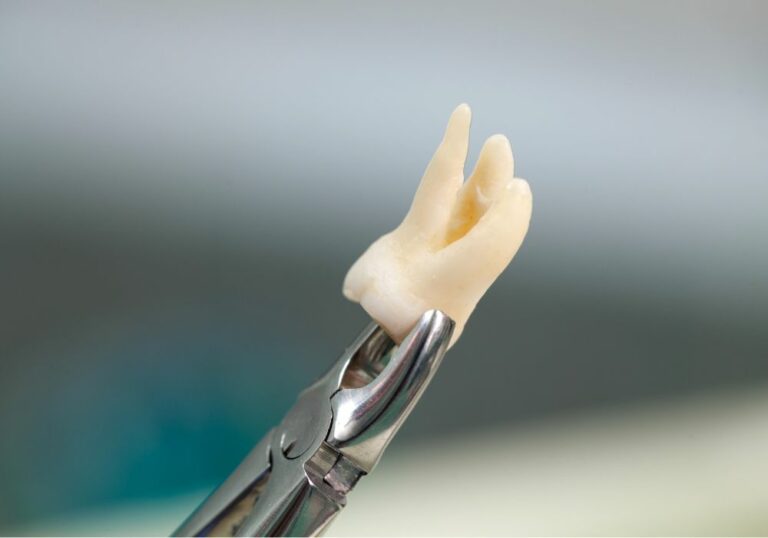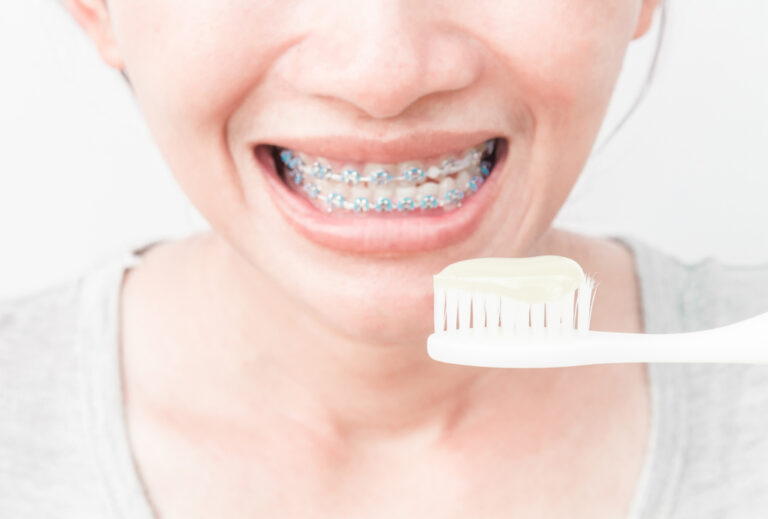As a parent, you want to do everything you can to help your baby grow and develop properly. An important part of development is the growth of teeth. Teeth begin developing while babies are still in the womb, but often don’t erupt through the gums until around 6 months of age. Some parents wonder if there are things they can do to help stimulate their baby’s teeth to grow in properly. This article will explore methods parents can use to promote healthy teeth growth in babies.
When do babies’ teeth start growing?
Teeth actually begin forming while babies are still in the womb. The process starts around the 6th week of pregnancy when the teeth buds begin to develop under the gums. However, these teeth generally don’t erupt through the gums until around 6 months of age. The timing varies from baby to baby, but this is the average timeline:
- 6 weeks gestation – Tooth buds begin forming under gums
- 3-4 months – Deciduous (baby) teeth continue developing under gums
- 6-12 months – Deciduous teeth erupt through gums
- 6-7 years – Permanent teeth begin erupting
So even though you can’t see teeth in a newborn, they are there under the gums developing right from the start!
Signs that teething is starting
How do you know when your baby is starting to teeth? There are some clues to look out for:
- Drooling – Increased drooling and damp clothing from extra saliva production is often one of the first signs of teething. The extra saliva helps tender gums.
- Chewing and biting – Babies may start chewing or biting on toys, fingers, clothing, etc. Applying pressure to the gums brings relief.
- Irritability or fussiness – Some babies show signs of discomfort or irritability when teeth are pushing through. Crying, refusing to eat, and disrupted sleep may occur.
- Swollen gums – The gums may appear slightly swollen and pink where new teeth are erupting. You may see small white bumps where teeth are about to poke through.
- Ear rubbing – Babies may tug at their ears as the linked nerves can cause ear pain during teething.
If you notice a combination of these symptoms, teething is likely underway! The first teeth to emerge are usually the bottom front incisors.
Methods to help stimulate teeth growth
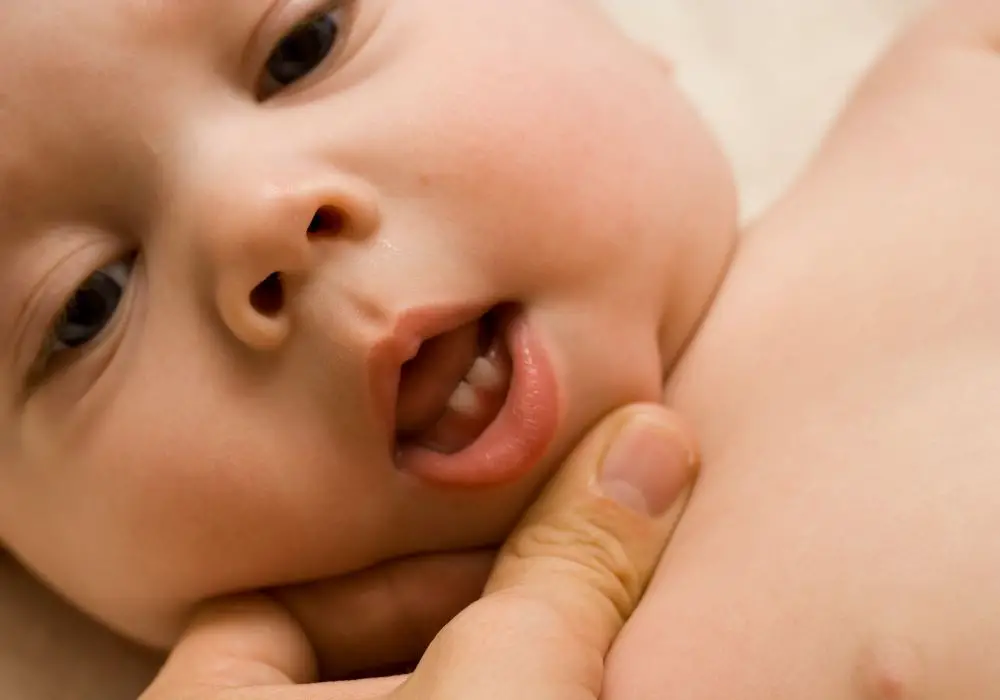
Here are some techniques parents can use to help promote healthy teeth growth and eruption in babies:
Massage gums regularly
Gently massaging your baby’s gums helps stimulate blood circulation in the area and can help teeth break through the gums. Use a clean finger or soft baby toothbrush/cloth to rub gums for a couple minutes daily, especially before bedtime. Applying light pressure and massaging in circular motions is soothing.
Offer teething toys
Giving babies safe teething toys or chilled teething rings allows them to apply pressure to tender gums themselves. Hard rubber or silicone teethers with bumpy textures are ideal. Refrigerating these toys helps numb gums. Avoid teething biscuits or gels – they can be unsafe.
Try cold foods
Spoon feeding your baby cold foods like yogurt or apple sauce can temporarily numb and soothe sore gums. You can also let them gnaw on chilled (not frozen) fruits like bananas or cucumbers. The combination of cold plus chewing motion brings relief.
Use medication
Over-the-counter pain relievers approved for infants, such as ibuprofen or acetaminophen, can help relieve teething discomfort. Always follow dosage instructions. Topical numbing gels or medications should only be used under medical supervision.
Practice good oral hygiene
Keep gums clean by gently wiping with a warm, damp cloth daily. Once teeth erupt, brush baby teeth twice a day using a soft baby toothbrush and fluoride toothpaste in an amount equivalent to a grain of rice. See a pediatric dentist around first birthday.
Foods that promote dental health
In addition to the techniques above, making sure your baby eats a diet that promotes good dental health helps stimulate teeth growth. Here are some key nutrients and foods to focus on:
- Calcium – Helps build strong tooth enamel. Found in dairy products, green leafy vegetables, salmon.
- Phosphorus – Important for tooth formation and health. Found in poultry, fish, eggs, beans.
- Vitamin D – Helps the body absorb calcium. Found in fortified milk and cereals. Also comes from sunshine.
- Fluoride – Makes tooth enamel resistant to decay. Found in fluoridated drinking water, salt.
- Iron – Important for tooth bud development. Found in fortified infant cereals, pureed meats.
- Vitamin K – Needed for proper tooth mineralization. Found in leafy greens, dairy.
- Protein – Important building block of teeth. Found in meat, eggs, dairy.
A balanced diet with a variety of these foods will help ensure your baby gets the nutrients needed for teeth to develop properly. Speak to your pediatrician about vitamin supplements if concerned your baby is not getting adequate nutrition. Avoid sugar, as it can lead to cavities.
Common concerns with baby teeth growth
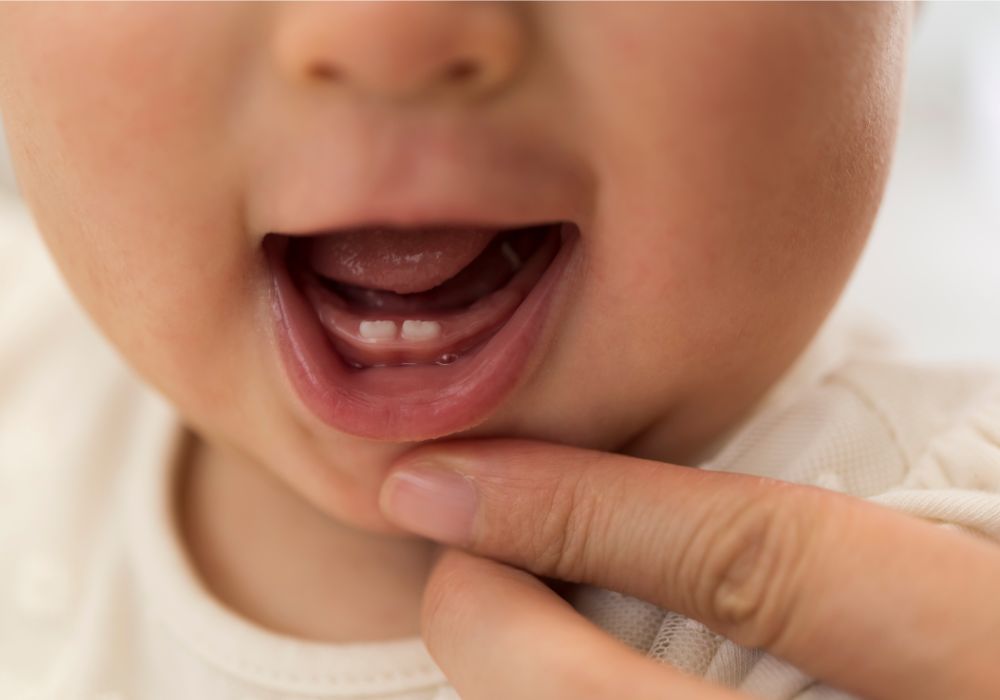
While most babies develop teeth normally, some parents have concerns about potential issues. Here are a few common questions:
My baby is 12 months and has no teeth – is this normal?
It’s quite normal for babies to get their first teeth anytime between 6-12 months. As long as your baby is healthy overall and reaching other milestones, late teething is likely just a variation of normal. Mention it at your next pediatrician visit.
Are teething tablets safe to use?
The FDA recommends against using teething tablets or gels containing benzocaine, a numbing agent. These can pose serious health risks to babies. Always consult your pediatrician before using any medication or supplement.
My baby has yellow stains on new teeth – what should I do?
Some faint yellowish staining is normal on new baby teeth as they calcify. Try wiping teeth with damp cloth at bath time. If stains persist, ask your dentist – remineralizing fluoride treatments may help strengthen and whiten enamel. Limit sugary food/drink which promotes stains.
My baby fell and chipped a new tooth – is this an emergency?
If your baby chips or knocks out a new tooth, contact your pediatric dentist right away. They may want to smooth sharp edges or restore the tooth. Baby teeth hold space for permanent teeth, so their health and development matters.
When to see a dentist?
The American Dental Association and American Academy of Pediatric Dentistry recommend that all babies have their first dental visit by 12 months old, or within 6 months of their first tooth erupting. This allows the dentist to check for proper oral development, tooth alignment, and decay risk. Early screening sets the stage for good lifelong dental health.
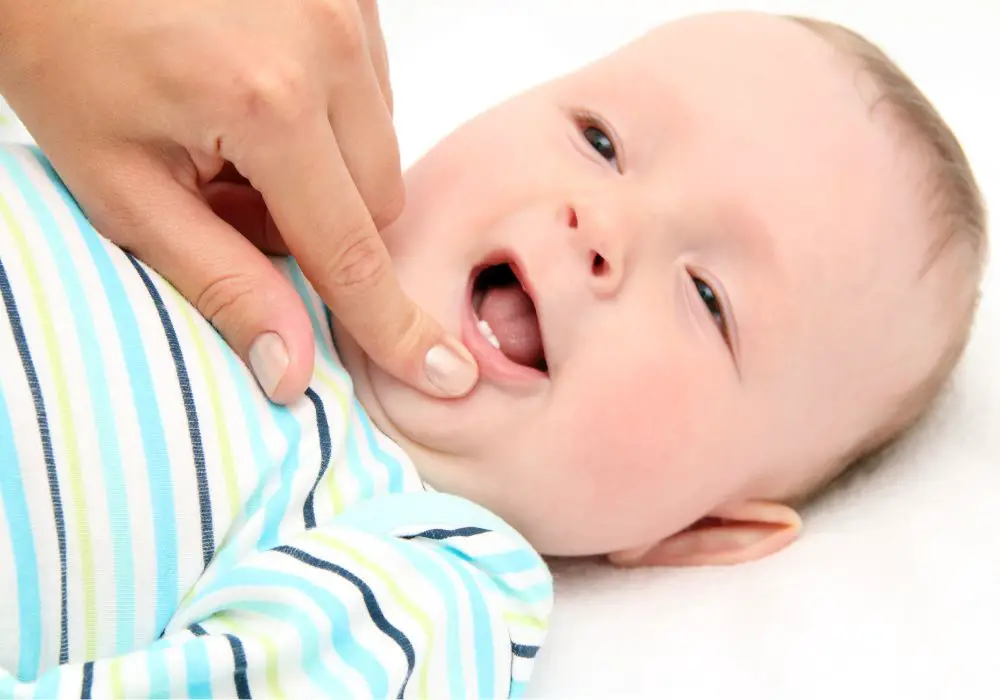
Conclusion
Teeth begin developing early on in babies, starting when they are still in the womb. There are many things parents can do to help stimulate the growth and eruption of baby teeth, like gum massage, teether toys, cold foods, and proper nutrition. While most babies get teeth normally between 6-12 months, see your pediatrician if you have concerns about delayed teething. Establishing good dental hygiene routines right away and seeing a pediatric dentist early on helps ensure your baby’s teeth develop strong and healthy.
Frequently Asked Questions
Here are some common questions and answers about stimulating baby tooth growth:
Q: What tooth usually erupts first in babies?
A: The bottom two front teeth (lower central incisors) usually erupt first around 6-10 months of age. The top four front teeth typically come in next.
Q: Is it okay to give my baby a pacifier?
A: Yes, pacifiers are fine for soothing babies as long they are not overused or kept in the mouth constantly. Introduce after breastfeeding is established. Never dip pacifiers in honey or sugar.
Q: How can I soothe teething pain at night?
A: Gently massaging gums, using a chilled teether, and giving an appropriate dose of infant pain reliever before bedtime helps babies sleep better during teething.
Q: Are fluoride drops recommended for babies?
A: Fluoride supplements may be recommended starting around 6 months old for babies who don’t get optimally fluoridated water. Check with your pediatrician.
Q: What foods should be avoided for baby tooth health?
A: Avoid sugary foods and drinks like juice, as well as excessive milk/formula in bottles, as these can lead to tooth decay. Sticky foods like dried fruit can also damage emerging teeth if not brushed away.

